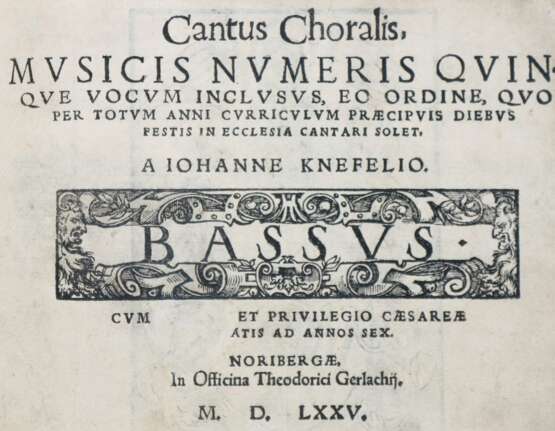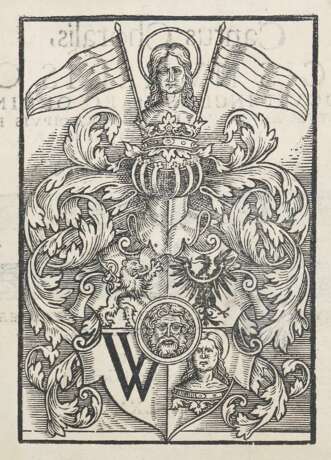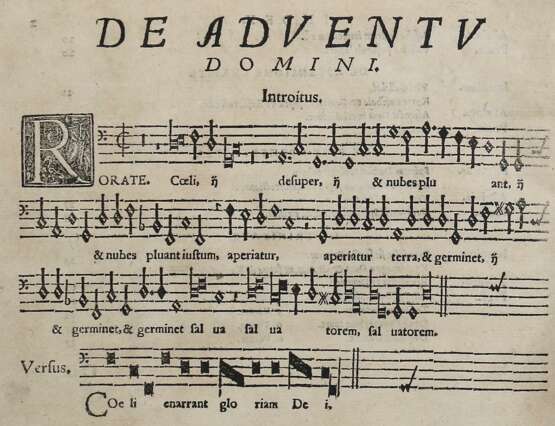Knöfel, J.
12.12.2023 10:00UTC +01:00
Classic
Starting price
3600EUR € 3 600
| Auctioneer | Auktionshaus Kiefer |
|---|---|
| Event location | Germany, Pforzheim |
| Buyer Premium | 1. Nicht gekennzeichnte Nrn.: Aufgeld 23 zzgl. 7 Mwst; 2. Mit R gekennzeichnte Nrn.: 23 zzgl. 19 Mwst; 3. Mit D gekennzeichnte Nrn.: Aufgeld 33 inkl. MWSt% |
Archive
The auction is completed. No bids can be placed anymore.

ID 1098185
Lot 211 | Knöfel, J.
Cantus choralis. Musicis numeris quinque vocum inclusus, eo ordine, quo per totum anni curriculum praecipuis diebus festis in ecclesia cantari solet. Nürnberg, Theodor Gerlach 1575. Qu.8°. [3] Bl., 37 num. Bl. mit Titelholzschnitt, gr. Wappenholzschnitt (verso Titel) u. Musiknoten in Holzschnitt. Mod. Prgt. (Schwach berieb.).
MGG VII, 1273 ff. RISM A I, K 990. - Einzige Ausgabe, äußerst selten. - "In seiner 1575 vorgelegten Sammlung "Cantus Choralis" stellte Knöfel einen Jahrgang von sieben Festtagsmessen in insgesamt 130 überwiegend fünf- bis sechsstimmigen motettischen Chorsätzen von meist prägnanter Kürze (daher für das gottesdienstliche Musizieren hervorragend geeignet!) zusammen. Da die Messen für die wesentlichen Feste des Kirchenjahres bestimmt sind, finden sich Sätze für nahezu jeden Anlass. Die kantablen, ruhig dahinfließenden Stücke kann man sich besonders gut in meditativen Gottesdiensten vorstellen; sie sind sowohl in solistischer wie auch chorischer Besetzung auszuführen, auch für kleinere Chöre geeignet!" (Elsie Pfister, Württ. Blätter für Kirchenmusik 6/2001). - "1571 widmete er (Knöfel) Herzog Heinrich sein Erstlingswerk, 'Dulcissimae cantiones'. Im Vorwort erweist er sich als eifriger Anhänger der Lehre Luthers. Sein nächstes Werk, Cantus choralis (1575), ist dem Rat von Breslau zugeeignet, der in den Stadtkirchen schon 1523 bis 1525 die luth. Lehre eingeführt und ev. Prediger eingesetzt hatte. schlesische Komponist J. Knöfel (auch Knefel, Knöbel und Knöphlin 1525-1617) "wurde kurz vor 1580, wie er in seinen "Cantiones piae 6 et 5 vocibug" selbst angibt, zum Capellmeister des Pfalzgrafen Ludwig bei Rhein ernannt; vorher scheint er sich am Liegnitzer Hof aufgehalten zu haben, denn er widmet seine "Dulcissimae quaedam Cantiones, numero XXXII. Quinque, Sex et Septem Vocum", 1571, dem Herzoge Heinrich von Schlesien, Liegnitz etc. und datirt dieselben "Liegnitz 1571". Die Hof- und Staatsbibliothek in München, die Berliner und Wiener, auch die bereits erwähnte Bibliothek in Liegnitz enthalten vier größere Drucksammlungen seiner Compositionen, darunter auch eine Sammlung deutscher Lieder zu 5 Stimmen, gedruckt zu Nürnberg bei Katharina Gerlachin, 1581. In letzterer sagt er in der Dedication an den Bürgermeister und Rath der Stadt Amberg, datiert "Heydelberg, am tag Petri und Pauli, im Jar 1581", dass "Herr Ludwig Pfalzgraff bey Rhein, Herzog in Beyern, mein gnedigster Herr, vorlängst befohlen, daß ich zu meiner besseren übung und exercitation Järlich, wo möglich, etliche Gesang im Truck verfertigen und außgeben lassen solle." Das ist auch der letzte Druck, den wir von ihm besitzen und verschwindet von da jegliche weitere Kunde über ihn, außer dass Schadaeus im J. 1611 eine sechsstimmige Motette "Aufer a nobis Domine" wieder neu veröffentlicht. Die Neuzeit hat noch keine Notiz von ihm genommen" (R. Eitner in ADB XVI, 319). - Titelblatt mit radiertem Stempel (etwas Textverlust beim Druck-Privileg), das Widmungsblatt im rechten Rand knapp beschnitten, geringfügige Randläsuren unauffällig restauriert, leicht gebräunt, sonst sehr gut erhalten.
| Auction house category: | Old Prints, Manuscripts and Theology, Music |
|---|
| Auction house category: | Old Prints, Manuscripts and Theology, Music |
|---|
| Address of auction |
Auktionshaus Kiefer Steubenstraße 36 75172 Pforzheim Germany | |
|---|---|---|
| Preview |
| |
| Phone | +49 (0)7231 92320 | |
| Fax | +49-7231-923216 | |
| Buyer Premium |
1. Nicht gekennzeichnte Nrn.: Aufgeld 23% zzgl. 7% Mwst; 2. Mit R gekennzeichnte Nrn.: 23% zzgl. 19% Mwst; 3. Mit D gekennzeichnte Nrn.: Aufgeld 33% inkl. MWSt | |
| Conditions of purchase | Conditions of purchase |




